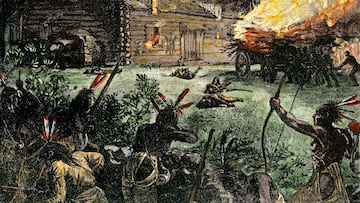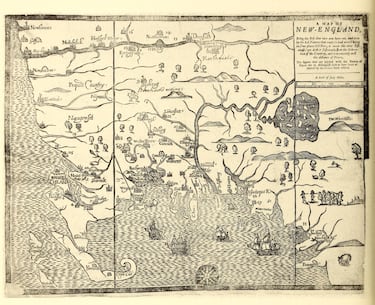King Philip's War: the Native American who rose up against the Pilgrims and brought about the Indian's doom
The bloodiest war in American history began a century before the Declaration of Independence when Native Americans tried to protect their land and culture.

Households across the United States celebrate Thanksgiving every year toward the end of November to give gratitude for the blessings we have. The idealized image we conger up for the occasion is the one we were taught as school children. That of the Pilgrims sitting down to a harvest feast with Wampanoag, the Native American tribe that helped them survive their first year in a New World.
While the two groups had signed a defensive alliance “treaty” the previous spring that would last over 50 years, the initial harmony between the two groups would develop into increasing tensions over time. The drivers of the friction were ever increasing numbers of English settlers, as well as their livestock, encroaching on the Native American’s land.
Furthermore, the cultural differences between the Pilgrims and Native American tribes play a major role. There were the English efforts to assimilate the Natives to their language, way of life and religion.
And then, there was the issue of what it meant to possess land and how laws should be enforced. Along with the colonists’ use of treaties regarding these issues to maintain the upper hand in any disputes.

Tensions between the Native Americans and Pilgrims come to a head
It all boiled over in June 1675. Just over a decade before Massasoit, the Sachem, or chief, of the Wampanoag who had negotiated the first peace treaty with the colonists at Plymouth died in 1661. His eldest son, Wamsutta, took over as chief.
But the following year he was arrested by the colonists, who called him Alexander, and died in their captivity. His younger brother, Metacom became the Wampanoag chief, who was known as Phillip to the English.
The final straw that broke the camel’s back was the execution by hanging of three Wampanoags on June 8, 1675, by the colonists at Plymouth after they held a trial that infringed on the tribe’s sovereignty. They were found guilty of the alleged murder of John Sassaman, a Native American who had converted to Christianity. The evidence was doubtful and didn’t follow the Puritans’ own ethical standards for capital punishment.

King Philip’s War: the Native American who rose up against the Pilgrims and brought about the Indian’s doom
Swansea was the first colonial settlement to be attacked on June 20, 1675. The Pokanoket, a group of the Wampanoag, killed several settlers while looting and destroying buildings. The raid strategy employed in this attack would become the blueprint for the tactics the Native Americans would use in further encounters.
With knowledge of the terrain and their non-European fighting style the Native Americans were able to gain the advantage in the beginning of the conflict. They assaulted English colonies throughout what is now New England and ambushed English forces as they traveled inflicting heavy losses on the colonists.
Metacom, or King Phillip, was able to develop a confederacy of tribes to attack the English. However, when he tried to enlist assistance from the Mohawk, they sided with the English.
Eventually though, after more than a year of fighting, and the English inflicting heavy loses on Native American settlements, King Phillip returned to his stronghold on Mount Hope. He was killed there on August 12, 1676 by John Alderman, an Indian fighting for the English.
Related stories
Metacom was beheaded, drawn and quartered. His head put on display on a spike in the Plymouth colony for a generation. There were minor clashes for a couple more years, but the King Philip’s War, considered the bloodiest war in American history per capita, was essentially over. So too was any real resistance to the continued expansion of the English colonies in Southern New England.
Get your game on! Whether you’re into NFL touchdowns, NBA buzzer-beaters, world-class soccer goals, or MLB home runs, our app has it all. Dive into live coverage, expert insights, breaking news, exclusive videos, and more – plus, stay updated on the latest in current affairs and entertainment. Download now for all-access coverage, right at your fingertips – anytime, anywhere.


